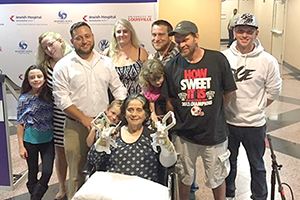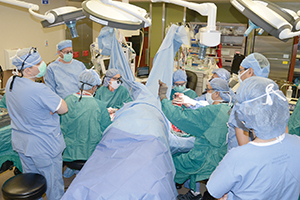Petting a dog, holding a child's hand bring joy and wonder
By COLLEEN SCHRAPPEN
In 2012, Louella Aker was helping neighbors clean up from a tornado near her home in Henryville, Ind. Shortly after, she started running a high fever. Aker, then 65, had developed septicemia from an infection she acquired during the recovery work.
She had both her legs amputated below the knee and lost her left hand and most of the right. Recovery was difficult, but she adapted.

Double hand transplant recipient Louella Aker poses with her family after a news conference at Jewish Hospital. Twenty surgeons from the Kleinert Kutz Hand Care Center, the Christine M. Kleinert Institute for Hand and Microsurgery and the University of Louisville performed the 17-hour procedure on Sept. 17. Fourteen staff members from Jewish Hospital and six anesthesiologists also assisted with the surgery.
Photo courtesy of Jewish Hospital; Kleinert Kutz Hand Care Center; and University of Louisville
"I had worked out a way to do things for myself. I could do personal care, cook a few things," Aker said.
She tried prostheses but found them bulky and hard to use. "I had a two-page list of things I couldn't do and wanted to do." Things like wrapping presents, turning the pages of a book and holding hands with her grandchildren.
Aker was aware that hand transplants had been performed at Kleinert Kutz Hand Care Center in Louisville, Ky., but she didn't think the procedure was a possibility for her. When her doctor told her she would be a good candidate, "I about fell out of my chair," she said.
Last year, on Sept. 17, after a battery of physical and psychological tests — and a year of waiting for a donor match — Aker became the 10th patient to undergo a hand transplant with the Louisville Vascularized Composite Allograft program, a partnership of Jewish Hospital, the Christine M. Kleinert Institute for Hand and Microsurgery, the Kleinert Kutz Hand Care Center and the University of Louisville.
Jewish Hospital is a member of Louisville-based Kentucky-One Health, which is part of Englewood, Colo.-based Catholic Health Initiatives. KentuckyOne plans to divest of Jewish Hospital and eight other facilities under a restructuring announced in May. However, according to Barbara Mackovic, KentuckyOne senior manager of media relations, KentuckyOne expects to retain the relationship and contractual agreements with this and other transplant programs connected with the University of Louisville.

Following his surgery in 2011, Donnie Rickelman builds strength and dexterity in his transplanted left hand. His transplant is considered the most successful for the Louisville Vascularized Composite Allograft program.
Photo courtesy of Jewish Hospital; Kleinert Kutz Hand Care Center; and University of Louisville
Donating tissue, time
The first human hand graft to have short-term success was done in Lyon, France, in September 1998. The first hand transplant in the United States — and the first such procedure worldwide to have long-term success — was performed at Jewish Hospital a few months later, in January 1999 by surgeons from the Kleinert Kutz Hand Care Center. About 85 people worldwide have received new hands since then.
Hand transplantation generally involves a 12- to 16-hour surgery with half a dozen attending surgeons and several fellows, nurses and anesthesiologists, said Dr. Tuna Özyurekoglu, the lead hand transplant surgeon with Kleinert Kutz.
"During the surgery, we reshape the structure, look at what's really in there — where are the nerves, where are the vessels?
"Then we connect the bone (of the patient and the donor hand), we measure them to the appropriate length and put them together with plates and screws, connect the blood vessels, fix the muscles, tendons and then the nerves. And then close."

Özyurekoglu
But that tedious, complex procedure is not the hardest part of the process, Özyurekoglu said: There aren't enough donors. "The main problem with this is that the donation of hands is a tissue donation, and not many people sign up for it."
The United Network for Organ Sharing, the organization that oversees the nation's organ and tissue transplants, requires a separate consent for hand and face donation than organ donation. Transplant candidates also must be a match for gender, blood type, hand size and skin tone and coloring.
Aker joined the donation registry in September 2015 and was on "pins and needles," she said. "I kind of thought it wouldn't take very long to find a match. We had a couple false starts where we thought we had a match, but something went wrong."
The other big obstacle to increasing the use of the procedure is the cost, said Christina Kaufman, the executive director of Kleinert Institute, the research side of the hand care center.
"This is still an experimental study, still not covered at all by insurance," Kaufman said. "Dr. Tuna and all the surgeons do this for free, basically. Without institutions like Jewish Hospital, you can't really do hand transplants. It's a huge economic burden for the doctors and their colleagues."

Kaufman
Özyurekoglu believes the prevalence of hand transplants will increase eventually. "There needs to be a financial push behind it to pay for drugs and surgeons and therapists," he said. "Jewish Hospital covered almost two months of (Aker's) recovery in the hospital" following her double hand transplant.
Exercise in patience
Since she was discharged in late November, Aker has undergone three hours of physical therapy a day, five days a week, working on her grip and pinching items between her fingers. She also does strengthening and dexterity exercises at home and wears a splint two hours each day to keep her hands in a natural position.
"I can now hold a spoon and feed myself pretty well," she said in December. "I can comb my hair, hold my grandkids' hands and pet my dog. These are all the things that bring me joy.
"The hardest thing is having patience. I wanted to just go through the surgery and wake up and be able to do everything … (but) I can tell daily that I'm improving."
Patients can expect to see the biggest gains in the first year after surgery, when nerves are regenerating, Kaufman said. It's also during that first year that a patient is most at risk of rejecting the new hand, though Kleinert Kutz has never had a patient experience rejection. Patients take immunosuppressant drugs for the rest of their lives.

Kleinert Kutz Hand Care Center lead surgeon Tuna Özyurekoglu discusses the finger positioning with the team during Aker's double hand transplant surgery at Jewish Hospital.
Stitch in time
Six years after Donnie Rickelman's hand transplant, he remains the hand center's biggest success.
"Donnie is the best outcome we've ever measured," said Özyurekoglu. His Carroll score, which calculates hand function, has improved at each annual visit to the hand center.
Rickelman, now 42, lost his left hand in 1998 during a factory accident. He didn't seriously start thinking about a transplant until a decade later.
"I thought I should get my questions answered," he said. After talking to the team at Kleinert Kutz, "I almost immediately knew I wanted to be a hand transplant recipient."
After the surgery, Rickelman committed himself to the intense therapy. "It was exciting, because you always see gains. It doesn't have the strength of the right, but it has pretty good function."
It's that outcome Aker is looking forward to. All of her adult life, Aker, now 69, had been an avid knitter. "To lose that ability was devastating," she said. "I am hoping that as time goes on and I heal, I'll be knitting again.
"A tragedy doesn't have to be the end of things."
Copyright © 2017 by the Catholic Health Association
of the United States
For reprint permission, contact Betty Crosby or call (314) 253-3490.